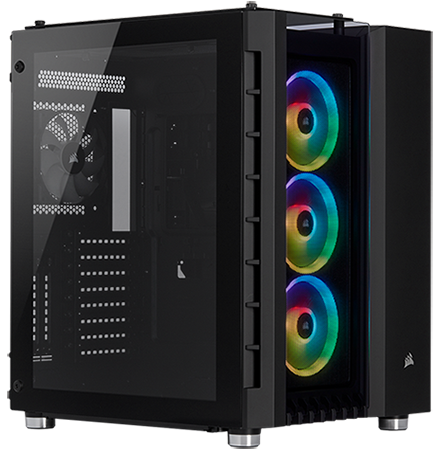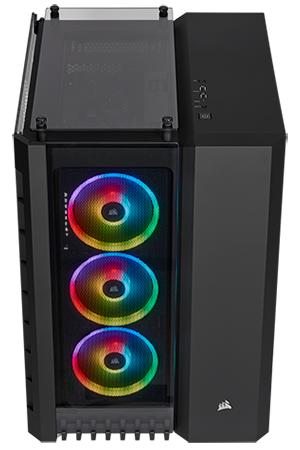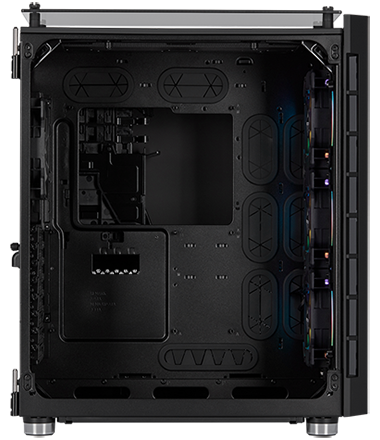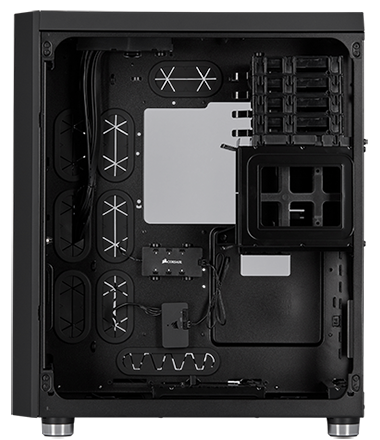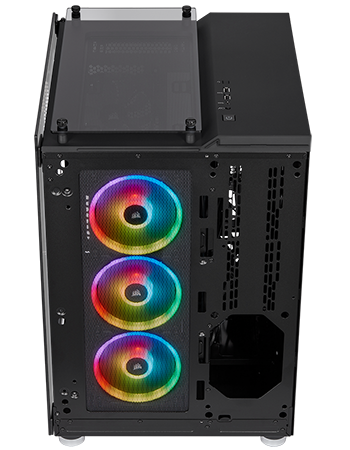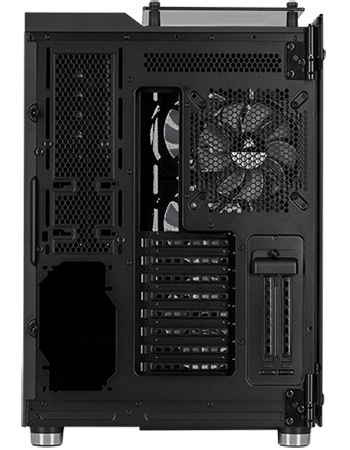Introduction
There's something endearing about cube-shaped PC enclosures. Perhaps it's the symmetry of the box, maybe it's the fact that there's a second chamber for storing excess clutter, or is it just that a cube makes a nice change from a regular tower? Whatever the case, if you excuse the pun, our fondness for the form factor has left us eager to try the Corsair Crystal Series 680X RGB.
Priced at £220, the 680X is clearly aiming to be one of the best cube enclosures to date, and first impressions are positive as it's an eye-catching piece of kit. Dimensions of 423mm (L) x 344mm (W) x 505mm (H) make this one of Corsair's largest cubes, and lashings of glass and RGB lighting give the whole thing a modern appearance.
The floating glass on the top and front is particularly tidy, and we like the fact the side panel is hinged and held in place by magnets; a slight tug releases the door, giving easy access to the internal components, and the door can also be lifted off its hinges if need be. We reckon Corsair has done a decent job in terms of aesthetics, however there are a couple of niggles that soon become apparent. The side-panel door isn't lockable, so security might be an issue, the matte-black paintwork is extremely easy to mark, and the large sections of plastic feel relatively cheap on what's a high-end case.
As you might have guessed, the RGB elements are a key contributor to the hefty price tag, as Corsair includes three of its LL120 RGB PWM fans and a Lighting Node Pro hub that provides synchronisation via the iCue software utility. The fans and node alone are worth £90, so we can think of the 680X as a £130 cube with premium RGB add-ons. Users choosing to employ their own fans will lament the fact that Corsair doesn't offer a non-RGB model of the chassis at retail, however there is a choice of colours, with both black and white variants available at the same £220 price point.
As a bigger brother to last year's 280X, the 680X is a far more expansive proposition; it might not be particularly deep, yet the chassis is about as tall as a typical mid-tower and considerably wider, so you'll need plenty of space to store it. At these dimensions, the 680X is all about is giving cube fanatics a spacious dual-chamber layout that offers ample scope for a high-end build in the front, plus plenty of space for any power, storage or cooling paraphernalia in the back.
Corsair promises "massive cooling potential," "flexible storage options" and "unlimited possibilities," but the nuances of a dual-chamber enclosure are such that a few restrictions are inevitable. Graphics card length is limited to 330mm - note that this is reduced significantly if you choose to install a radiator in the front - and though there's ample room to install a radiator in the roof, the mounting points aren't offset, making it very difficult to install a push/pull setup without fouling motherboard heatsinks.
Possibilities aren't unlimited, but there is plenty of potential for an extreme build. Supported motherboard form factors include Mini-ITX, Micro-ATX, ATX and E-ATX, rubber-grommeted cable-routing holes are in plentiful supply, and storage support in the rear chamber is spread across a 3.5in cage capable of housing three drives and four stacked 2.5in trays. It's nice having the option to install up to seven drives, yet it won't have escaped your attention that there's no active airflow back here, which isn't ideal if you're using, say, a couple of hard disks.
As you'd expect in mid-2019, the I/O ports lining the top of the case include two USB 3.1 Gen 1 Type-A, one USB 3.1 Gen 2 Type-C, as well as the usual power, reset and audio. Corsair also includes four fans as standard, though on a case intended to be a visual treat, we're surprised the rear 120mm exhaust is a standard SP120 three-pin fan that isn't RGB illuminated. What's more of a nuisance is that there's also no fan hub inside the case. Corsair's Node Pro is for lighting control only, meaning each of the four case fans still need to be attached to motherboard headers in order to function.






